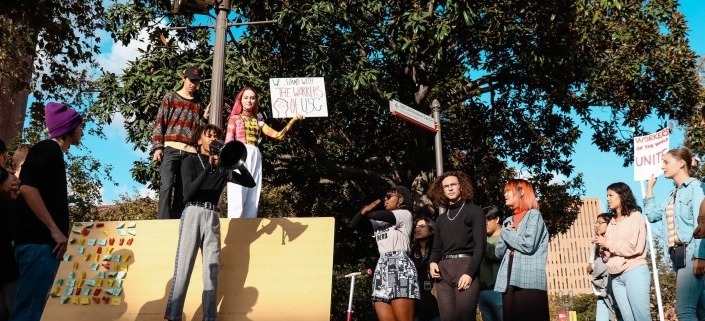The University and its students must be more considerate of essential USC staff

Campus turned into a ghost town within a matter of weeks, but USC employees have remained active since student activities grounded to a halt. While the University has taken great precautions to keep faculty and staff at home amid increasing coronavirus concerns, it takes a village to run USC’s 226-acre University Park Campus, and each job carries its own set of challenges.
From Trader Joe’s staff to USC Housing employees to IT security workers, many employees that work at the University are making sacrifices to keep the University body housed, fed and connected to services like healthcare and internet access.
Many Trader Joe’s employees fear they will contract the virus despite social distancing measures implemented by the chain. The store currently restricts hours during restocking periods and only serves “senior customers” and “customers with disabilities who may need special assistance” during the first hour of operation, but cashiers greet a steady stream of shoppers throughout their shift — likely coming into contact with carriers of the virus.
Some USC Housing staff carry spray bottles with disinfectant for the same reason, and residence halls now require students still living on campus to use face recognition technology upon entering instead of scanning their fingerprint. Despite these precautions, many essential workers who cannot work from home fear that increased sanitation may not be enough to keep the virus at bay.
Medical professionals like those at Keck Medicine of USC work around the clock to provide healthcare to the Los Angeles community, and IT workers work long hours to prevent Zoom-bombings and maintain internet security, according to employees. With little idea as to how long these circumstances will last, the University and administrators serve important roles in adapting institution operations to online formats seamlessly and communicating policy changes effectively.
As of April 8, all non-essential USC staff unable to complete work from home became entitled to paid administrative leave through May 13 — but that period will end, leaving spring semester employees uncertain about their summer employment. This policy is an improvement however upon the actions of L.A. County, which issued eligible employees two weeks of paid administrative leave and up to 12 weeks’ reduced emergency paid sick leave under the Emergency Paid Sick Leave Act. Both frameworks excel in comparison to Trader Joes’ token employee bonuses and extended sick time reviewed on a case-by-case basis through April 15.
Non-essential workers who cannot perform their roles online will soon find themselves in a dire predicament: stay home and keep their families safe and face financial hardship or use sick time off in hopes that they will be able to return to recover their losses.
Meanwhile, non-essential student workers unable to work from home are able to log their hours and receive normal pay beyond the two-week pay period. This is helpful for students who receive financial aid through work-study, but it makes little sense that the barista at a shuttered coffee kiosk should struggle to receive income while students who normally do their homework behind department reception desks still get full pay.
In an ideal world, both groups of employees would receive compensation during this period of upheaval. If that outcome is not possible, USC may need to reconsider who is receiving compensation and move forward with more utilitarian measures. Additionally, students must take time to acknowledge essential workers on campus and overtaxed employees off campus. They ought to remain informed by reading their emails regularly, and they should stay positive by taking care of themselves as well as thanking those around them.
The community has entered a period that requires patience, both on behalf of professionals and their clients. Campus is not dead, and its staff continue to face new challenges that should not go unnoticed.

